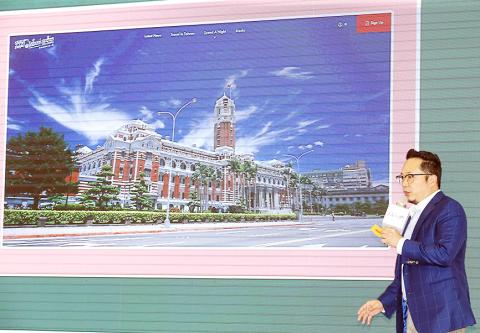The Presidential Office Building is at the center of a new tourism development program, with foreigners being offered a chance to spend the night in the building’s compound and become an “ambassador for Taiwan.”
The “Spend a Night at Taiwan’s Presidential Office Building” program is aimed at changing the building’s image as a former symbol of authoritarianism to mark its 100th anniversary and promoting Taiwan as “one of the friendliest nations in the world, the General Association of Chinese Culture (GACC), which is organizing the program, said in a statement.
The program “is the first of its kind in the world and demonstrates Taiwan’s democracy, freedom and openness,” Presidential Office spokesman Xavier Chang (張惇涵) said.

Photo: CNA
Applicants must be older than 20 and must make a video explaining why they want to visit Taiwan, what it is about Taiwan that attracts them and why they should be selected, Chang said.
The association said it plans to accept 10 groups of up to two people each in the first phase of the program, with one sleepover scheduled per week.
Guests would stay in a 14 ping (46.3m2) space in the Lixing Building with a view of the Presidential Office Building, which GACC described as a “true presidential suite.”
A personal housekeeper and breakfast would be provided, as well as an opportunity to attend the daily flag-raising ceremony and tour the Presidential Office Building, it said.
The stay would also include a customized itinerary, GACC deputy secretary-general Lee Hou-ching (李厚慶) said.
The first visitors would be welcomed in October, Chang said.
Those selected for the program would have to arrive before 10pm and leave no earlier than 5am the following day, for security reasons, the Presidential Office said.
A three-member panel would review the applications and select the winners: comedian and TV host Ugur Rifat Karlova, better known as Wu Feng (吳鳳); cultural commentator Chan Wei-hsiung (詹偉雄); and travel blogger Alston Hsu (許傑).
The reach of an applicant’s influence would be an important factor in the decision, Karlova said.
Hsu told reporters that applicants’ online visibility would be very important.
The application period began yesterday and will be open through the end of the month.
Applications can be submitted through the English-language Web site: www.nightattaiwan.tw/en.
Asked if Chinese nationals would be eligible to apply, Chang said the contest was open to all non-Republic of China (ROC) passport holders who meet the qualifications.

TRAGEDY STRIKES TAIPEI: The suspect died after falling off a building after he threw smoke grenades into Taipei Main Station and went on a killing spree in Zhongshan A 27-year-old suspect allegedly threw smoke grenades in Taipei Main Station and then proceeded to Zhongshan MRT Station in a random killing spree that resulted in the death of the suspect and two other civilians, and seven injured, including one in critical condition, as of press time last night. The suspect, identified as a man surnamed Chang Wen (張文), allegedly began the attack at Taipei Main Station, the Taipei Fire Department said, adding that it received a report at 5:24pm that smoke grenades had been thrown in the station. One man in his 50s was rushed to hospital after a cardiac arrest

A car bomb killed a senior Russian general in southern Moscow yesterday morning, the latest high-profile army figure to be blown up in a blast that came just hours after Russian and Ukrainian delegates held separate talks in Miami on a plan to end the war. Kyiv has not commented on the incident, but Russian investigators said they were probing whether the blast was “linked” to “Ukrainian special forces.” The attack was similar to other assassinations of generals and pro-war figures that have either been claimed, or are widely believed to have been orchestrated, by Ukraine. Russian Lieutenant General Fanil Sarvarov, 56, head

SAFETY FIRST: Double the number of police were deployed at the Taipei Marathon, while other cities released plans to bolster public event safety Authorities across Taiwan have stepped up security measures ahead of Christmas and New Year events, following a knife and smoke bomb attack in Taipei on Friday that left four people dead and 11 injured. In a bid to prevent potential copycat incidents, police deployments have been expanded for large gatherings, transport hubs, and other crowded public spaces, according to official statements from police and city authorities. Taipei Mayor Chiang Wan-an (蔣萬安) said the city has “comprehensively raised security readiness” in crowded areas, increased police deployments with armed officers, and intensified patrols during weekends and nighttime hours. For large-scale events, security checkpoints and explosives

PUBLIC SAFETY: The premier said that security would be tightened in transport hubs, while President Lai commended the public for their bravery The government is to deploy more police, including rapid response units, in crowded public areas to ensure a swift response to any threats, President William Lai (賴清德) said yesterday after a knife attack killed three people and injured 11 in Taipei the previous day. Lai made the remarks following a briefing by the National Police Agency on the progress of the investigation, saying that the attack underscored the importance of cooperation in public security between the central and local governments. The attack unfolded in the early evening on Friday around Taipei Main Station’s M7 exit and later near the Taipei MRT’s Zhongshan